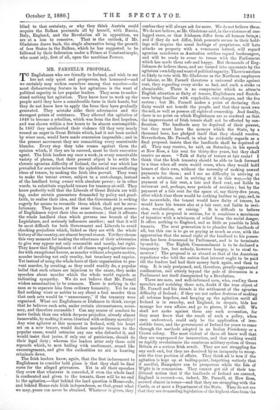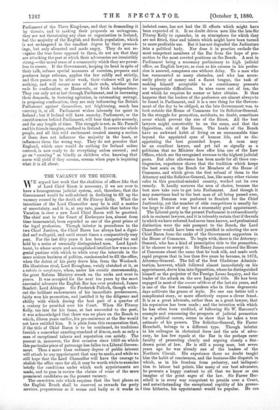MR. PARNELL'S PROPOSAL.
TO Englishmen who are friendly to Ireland, and wish to see her not only quiet and prosperous, but honoured—and we certainly may reckon ourselves among that number—the most disheartening feature in her agitations is the want of political sagacity in her popular leaders. They seem to under- stand nothing but agitation. They know how to work up the people until they have a considerable force in their hands, but they do not know how to apply the force they have gradually generated. They mistake alike their adversaries and the strongest points of resistance. They allowed the agitation of 1848 to become a rebellion, which was from the first hopeless, and was shown within a few hours to be almost contemptible. In 1867 they misdirected their violence till they very nearly roused an anger in Great Britain which, had it not been cooled by wiser men, would have made concession impossible ; and in the present movement they are committing every conceivable blunder. Every step they take rouses against them the opinion which, if they are to succeed, must be their executive agent. The Irish leaders say once a week, in every conceivable variety of phrase, that their present object is to settle the chronic agrarian difficulty of Ireland, the social war which has prevailed for centuries between the upholders of two conflicting ideas of tenure, by making the Irish idea prevail. They want to make the tenant owner, subject to a rent-charge, instead of the landlord being owner with absolute power; or in other words, to substitute copyhold tenure for tenancy-at-will. They know perfectly well that the Liberals of Great Britain are will- ing, under certain guarantees demanded by policy and good- faith, to realise their idea, and that the Government is seeking eagerly for means to reconcile them which shall not be revo- lutionary. They know, at the same time, that great masses of Englishmen reject their idea as monstrous ; that it affronts the whole landlord class which governs one branch of the Legislature, and seriously influences another; and that it will be most difficult for both Government and Liberals to avoid shocking prejudices which, linked as they are with the whole history of the country, are almost beyond reason. Yet they choose this very moment for making the reluctance of their adversaries to give way appear not only reasonable and manly, but right. They know that Englishmen of all classes regard agrarian mur- der with exceptional horror, as murder without adequate motive, murder involving not only cruelty, but treachery and caprice. Yet instead of using the whole force of their organisation to pre- vent murder, by creating, as they could readily do, a popular belief that such crimes are injurious to the cause, they make speeches about murder which the whole world regards as indicating sympathy. We do not believe that Mr. Parnell wishes assassination to be common. There is nothing in the man so to separate him from ordinary humanity. Yet he can find nothing wiser or nobler to say about a foul murder than that such acts would be "unnecessary," if the tenantry were organised. What are Englishmen or Irishmen to think, except that he believes such acts, under certain circumstances, neces-
sary, and therefore excusable Can any course of conduct be more foolish than one which deepens prejudice, already almost immovable, by making it seem identical with ordinary morality? Any wise agitator at this moment in Ireland, with his heart set on a new tenure, would declare murder treason to the popular cause, would ostracise any one who defended it, and would insist that juries, if only out of patriotism, should do their legal duty ; whereas the leaders utter only those cold reproofs which, to men boiling with excitement, sound like encouragement, and give the authorities no aid in hunting criminals down.
The Irish leaders know, again, that the first inducement to Englishmen to consider bold plans is that they shall be final cures for the alleged grievances. Yet in all their speeches they avow that whatever is conceded, if even the whole land is confiscated and given to the tenants, there will be no end to the agitation,—that behind the land question is Home-rule, and behind Home-rule Irish independence, so that, grant what we may, peace can never be obtained. Whatever is given, they
confess they will always ask for more. We do not believe them. We do not believe, as Mr. Gladstone said, in the existence of one- legged races, or that Irishmen differ from all human beings ; and if they do not differ, Irish peasants secure in their hold- ings will acquire the usual feelings of proprietors, will hate attacks on property with a venomous hatred, will regard agrarian murderers as Australian settlers regard bushrangers, and will be ready to come to terms with the Parliament which has made them safe and happy. But thousands of Eng- lishmen do believe them, and are turned into opponents by the agitators' own fol ly and want of political sagacity. There is no class so likely to vote with Mr. Gladstone as the Northern employers of labour, so Mr. Parnell threatens a universal strike against rent, they regarding every strike as bad, and such a strike as abominable. There is no compromise which so attracts English attention as fixity of tenure, Englishmen and Scotch- men being familiar with copyholds, rent-charges, and the feu system ; but Mr. Parnell makes a point of declaring that fixity would not benefit the people, and that they must own the soil, as well as possess all rights of ownership. And finally, there is no point on which Englishmen are so resolved as that the improvement of Irish tenure shall not be effected by con- fiscation. The landlords may be deprived of their powers, but they must have the moneys which the State, by a thousand laws, has pledged itself that they should receive. Nevertheless, Mr. Parnell, in what he evidently regards as a final proposal, insists that the landlords shall be deprived of all. They may receive, he said, on Saturday, in his speech at New Ross, a fair rent for thirty-five years, but they shall receive no more. "Talk of fixity of tenure at fair rents I I think that the Irish tenantry should be able to look forward to a time when all rents would cease, when they would hold homes of their own, without the necessity of making annual payments for them ; and I see no difficulty in arriving at such a solution, and in arriving at it in this way,—by the payment of a fair rent, a fair and fixed rent, not liable to recurrent and, perhaps, near periods of revision ; but by the payment of a fair rent for the space of, say thirty-five years, after which time there would be nothing further to pay, and, in the meanwhile, the tenant would have fixity of tenure, he would have his tenure also at a fair rent, not liable to revi- sion, revaluation, or raising." It is difficult to believe that such a proposal is serious, for it combines a maximum of injustice with a minimum of relief from the social danger. It offers nothing to England, and as little as possible to Irish tenants. The next generation is to plunder the landlords of all, but this one is to go on paying as much as ever, with the aggravation that the moral right of the landlord to his posses- sions has been denounced by Parliament, and is to terminate by-and-by. The Eighth Commandment is to be declared a temporary law, but nobody, however hungry, is to steal to- morrow ! The proposal is as absurd as that of the American repudiator who told the nation that interest ought to be paid till the lenders had had their money back again, and then to stop. It is only postponed, and, therefore, greatly-aggravated confiscation, and utterly beyond the pale of discussion in a Parliament not itself disorganised by a Revolution.
There are men, and well-informed men, who, reading these speeches and watching these acts, doubt if the true object of Mr. Parnell and his friends is the settlement of the agrarian difficulty of Ireland ; if they are not rather desirous of making all reforms hopeless, and keeping up the agitation until all Ireland is in anarchy, and England, in despair, bids her manage her own affairs, and go to pieces, if she will. We shall not make against them any such accusation, for they must know that the result of such a policy, when once understood, could only be the application of irre- sistible force, and the government of Ireland for years to come through the methods adopted in an Indian Presidency or a
Crown colony. The most violent of them all know well that
they are unprepared for insurrection, and that nothing would so rapidly revolutionise the cumbrous military system of Great Britain as a serious Irish revolt. They are not struggling for any such end, but they are deceived by an incapacity to recog- nise the true position of affairs. They think all is won if the
agitation is kept up at boiling-point, forgetting entirely that
if needful, Hampshire can be prosperous while the Isle of Wight is in commotion. They cannot get rid of their tra- ditional notion that if the landlords of Ireland are coerced, England is coerced—as, indeed, Mr. Parnell, at New Roes, avowed almost in terms—and that they are struggling with the Castle, or at most a Department of the State. They do not see that they are demanding legislation of the highest class from the Parliament -of the Three Kingdoms, and that in demanding it by threats, and in making their proposals so outrageous. they are not threatening any class or organisation in Ireland, but the majority of the English and Scotch population, which is not endangered in the smallest degree by their proceed- ings, but only alienated and made angry. They do not re- cognise the true force opposed to them, do not see that they are attacking the post at which their adversaries are irresistibly strong,—the moral sense of a community which they are power- less to coerce. If the Government, keeping its head in spite of their talk, refuses special measures of coercion, prepares and produces large reforms, applies the law coldly and strictly,
• and then passes on to other work, their violence will go for nothing, and will secure none of their ends, whether those ends be confiscation, or Home-rule, or Irish independence. They can only act at last through Parliament, and in increasing their demands, in fostering agitation, in extenuating outrage, in proposing confiscation, they are only influencing the British Parliament against themselves, not frightening, much less coercing it, at all. Parliament wishes intensely for quiet in Ireland ; but if Ireland will have anarchy, Parliament, or the constituencies behind Parliament, will bear that quite serenely, and for any length of time. The struggle is not, as Mr. Parnell and his friends imagine, confined to Ireland. It covers the whole people, and all this wild excitement created among a section of them does not influence the majority in the least, or influences them the wrong way. They do not perceive that England, which once would do nothing for Ireland unless coerced, is now ready to do everything unless coerced ; and go on " coercing " as blindly as children who, knowing that nurse will yield if they scream, scream when papa is inquiring -what it is all about.



































 Previous page
Previous page